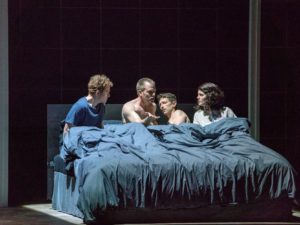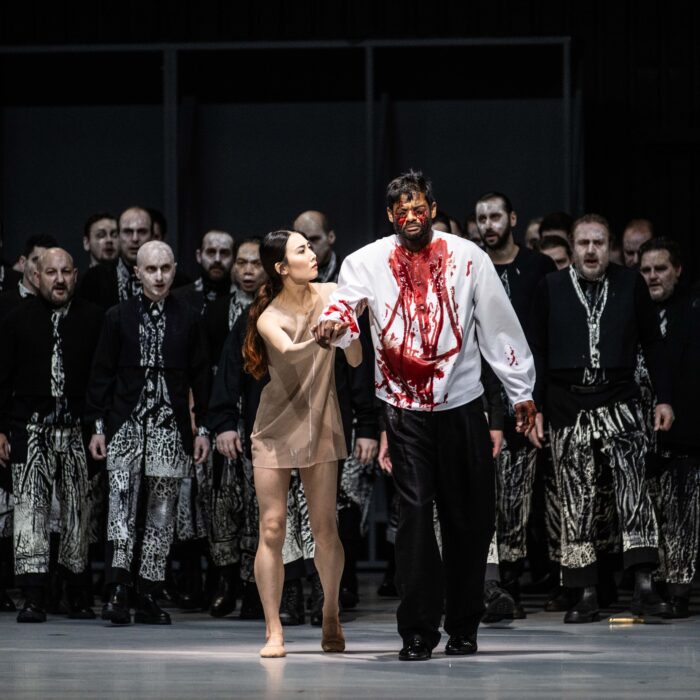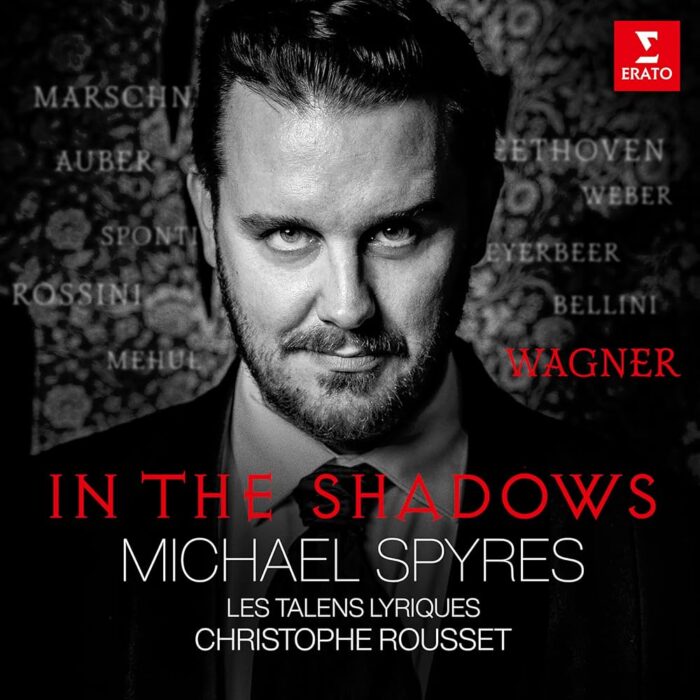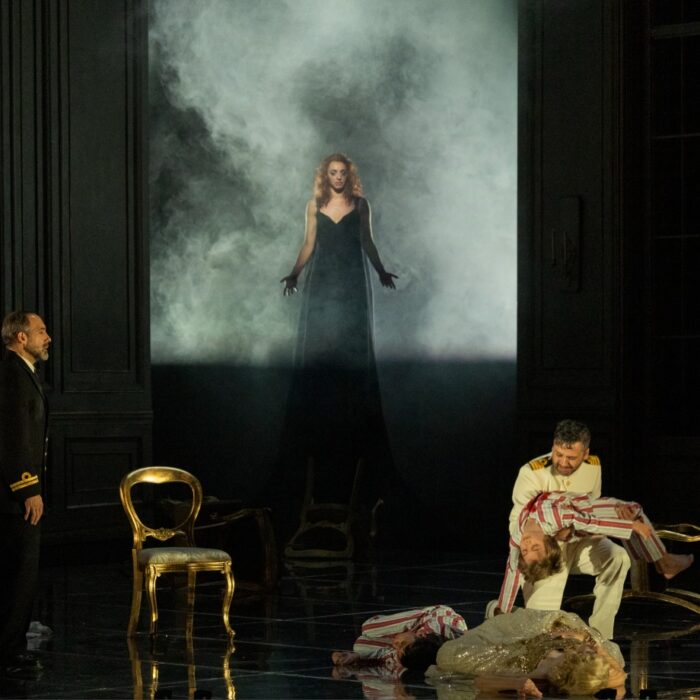
New York City Opera 2016-17 Review – Angels In America: Peter Eötvös’s Work Finds A Remarkable Cast Within A Forgettable Score
By Francisco SalazarIt’s hard not to applaud the New York City Opera for its return to form.
A few years ago the company went into bankruptcy and had to close. It was devastating for opera lovers who wanted an alternative to the Metropolitan Opera and the rather barren New York opera landscape in general.
But times have changed and thankfully the company is back in shape and is trying something new. Last year it kicked off its initiative to present opera in Spanish every year and this year it has kicked off its annual LGBT opera for pride month.
This initiative brings together the idea that opera is for everyone and that diversity exists within the art form. These initiatives will ultimately differentiate the company as it not only looks to re-establish itself as a pre-eminent operatic force in a now-bubbling New York opera environment.
The problem, however, is picking the works that should be played. And with the company’s first LGBT Opera “Angels in America,” City Opera has mixed results.
The Score
The biggest issue with the opera is the music itself. I want to preface this by noting that I am a lover of opera that I can walk away humming a melody or feeling a particular attachment to a musical moment. I want to walk away with a desire to listen to the piece again and discover new things.
With this piece, one walks away hoping never to encounter it again.
I understand that my musical tastes should not be imposed on my evaluation of a work of art. But unfortunately, subjectivity can be hard to get away from when it comes to assessing any work, especially when it was not intended just for the composer’s listening pleasure, but an audience’s.
And unfortunately, the intention and audience that Peter Eötvös had in mind for this piece are far from clear. It was clear to me, from viewing all the newly empty seats, that a large portion of the audience was not enthused by the piece.
The music serves as mere background noises. It’s almost as if Eötvös was trying to create a soundscape of experimental noise with singers constantly emoting and then once in a while holding a phrase. In many ways, it’s very dialogue heavy and evokes the Broadway style. That can be beneficial to the audience, but it works when there are melodies and rhythms that are pleasant to hear.
I commend the composer for using the guitar, saxophone and even some electronic music. There is also a trio of singers who continuously serve as echoes, and while these experiments are interesting, I couldn’t connect on a deeper emotional level. Few people ever get an emotional kick from hearing a brain working, and that is probably the aptest way to describe the score itself.
The mere idea of climax or direction is nowhere to be seen either. One never gets the sense that the composer wanted to ever really bring a cathartic moment as the music stays in the same tones throughout the two hours. It’s always slow and atmospheric and when it’s time to accompany singers it goes in one direction while the vocal line goes in another. There is a great sextet that turns into a septet and then into an octet except it never seems to go in any direction and in the end, the opera just ends without anyone even realizing.
As I noted, audiences left after the first act and the applause the accompanied the final curtain call was tepid at best. And with such response, it only plays to the stereotypes of people saying opera is boring. In this case, it is.
The Libretto
The other big issue is Mari Mezei’s libretto. Mezei cut the seven-hour play into a two-hour opera and while there is a mix of hallucinations and dreams mixed with real life in the first act, it all becomes a mess in Act Two. While the first act brilliantly blends the hallucinations with the character’s issues, the second act becomes a bit of a confusing mess filled with symbolism. The plot is lost half way through because Mezei and Eötvös seem more concerned with experimenting with form and structure than telling a coherent story. And while it is okay to use symbols, there should be a focus. Part of that lack of focus is the littering of eight different characters that appear and reappear and never feel completely fleshed out.
Prior’s story is the only really coherent one as it follows him dying of AIDS. Midway through the second act, there is no sense of his suffering or his impending death. Belize’s character appears and reappears but one never understands why there is such great importance to him. Joe and Louis’ guilt for leaving their spouses is never really resolved while Harper’s character disappears midway through only to return for a moment and then disappear again. We know she is addicted to Valium but never know how exactly she changes or even attempts to act on her addiction. Perhaps the most objectionable of moments in the opera revolves around Roy’s character, a closeted homosexual who is another comic figure who seems to never evolve or feel any type of guilt or remorse.
The one thing I give props to is that Mezei uses comedy in many instances with the use of vulgarity and other jokes in spite of such tragedy. This is something some operas have never learned to employ. However, these comic tricks can’t save the night.
Production
Sam Helfrich’s production didn’t help matters either. The scenery was a mere black tiled wall that had a bed entering in and out, a hospital bed going in and out, a table that moved, some interesting lighting effects that allowed audiences to see the differences between the hallucinations and the real world. Helfrich eventually blended the lighting, making it hard to know what was real and what was not towards the end of the opera.
Helfrich also took numerous risks having his singers bare all during a sex scene with Joe and Louis. But with 17 scenes showcased in this work, the idea of seeing the same dungeon-like setting with a bed or a table became routine, making it hard to really see an overall arc in the work.
The Cast
But not all is bad news. The New York City Opera has aligned a cast of some incredible singers. It’s hard to speak of what all are capable of doing vocally but the glimpses that this score permitted and the acting allowed audiences to see that some of these singers will be stars.
The two standouts vocally of the night were by far Kirsten Chambers and Sarah Beckham-Turner. While Chambers does not really enter the scene until the end of act one and throughout the second act, her voice resonated throughout. Eötvös gives the Angel long lines and extended high notes that allow audiences to truly appreciate Chambers’ powerful dramatic soprano. Moreover, she was also forced to show her superb florid runs near the end of the first act and at the beginning of the second act. As an actress Chambers was physical, moving whimsically at the beginning, moving to the bed and flirting with Andrew Garland’s Prior and at one point opening her legs in very sexual ways.
Meanwhile, Beckham-Turner showed a lush soprano in her opening solo, delving into the few long lines that Eötvös writes for the soprano. She conveyed a sense of Harper’s grief with her melancholic tone and held the higher notes as much as she could. The soprano also brought out the character’s insecurities, moving about the stage with trepidation, never taking a firm stance even when confronting her husband Joe about his homosexuality. Beckham-Turner also played the role of Ethel Rosenberg, showing a beautifully flexible voice yet cool tone in her final song to Roy in Act two.
In the lead role of Prior, Andrew Garland brought a compelling portrait of the character’s grief and youthfulness. At the beginning of the opera, Garland moved about the stage with energy and vigor even if he was sick. Things quickly changed and toward the end of the first act when Louis abandons Prior. Garland showed a vulnerable side as his walking was less flexible and more limped. Only towards the end when he accepts his role as the prophet did that vigor return. Vocally Garland’s role has a number of outcries that really showed his forceful baritone and a tone that is flexible and appealing. In the second scene with Chamber’s Angel, Garland combined his baritone well with Chamber’s soprano, the combined vocal forces ringing throughout the hall.
In the comic role of Roy Cohn, Wayne Tigges’ dug into the text, emphasizing the vulgarity of the character in his dialogue. At one point he despondently sang the dialogue of his scene and immediately took on a lighter tone in his interaction with Joe. Here he took Michael Weyandt and started fawning all over him in a very sexual way. His interactions had a very similar tone. At one point when he is diagnosed with AIDS, Tigges’ voice grew in strength, repeating lines sarcastically in disbelief. And in the death scene, Tigges didn’t let go of the character’s arrogance. At one point when the music dies down and there is a sense that Roy has died, Tigges jumped, surprising the audience. The voice continuously maintaining that vigor and fierceness.
As Louis, Aaron Blake brought a strong physicality to the role, portraying the character’s sexual lust as well as his guilt. Vocally the tenor had a gorgeous timbre but his resources sometimes died out in the higher register. One hopes to hear this tenor in a more traditional rep to see the capabilities of the lyrical voice.
Michael Weyandt dug into the insecurities of Joe. At the beginning of the opera, he played Joe with a very rigid stance. Even as Roy touched him inappropriately he never let his guard. But once he is able to open up, Weyandt was able to move about with more liberty.
Matthew Reese showed a unique countertenor while Sarah Castle was also solid in the role of Hannah with a bright voice.
However, this cast deserves a better opera to really bring their vocal qualities to the forefront. One hopes to see this wonderful cast return to the New York City Opera and really be able to shine without music that interferes.
Conductor Pacien Mazzagatti must be given props for holding the opera intact with such tricky rhythms and ultimately keeping the work flowing.
I must applaud City Opera because it’s never easy to experiment and it’s sometimes too easy to go with the classics. Some will fail and other times these experiments will be hits. In this case, the company aligned an appealing cast that showed audiences that singers still reign in this business regardless of a fractured opera.


